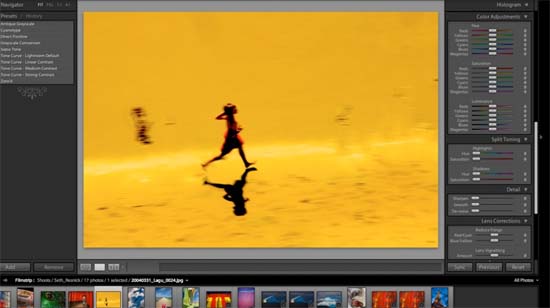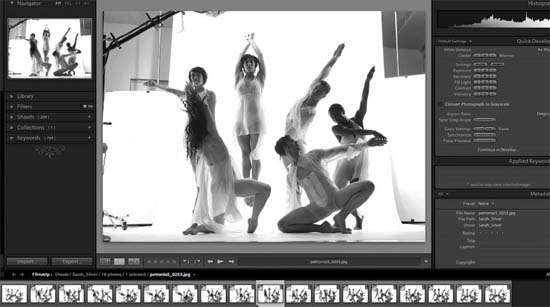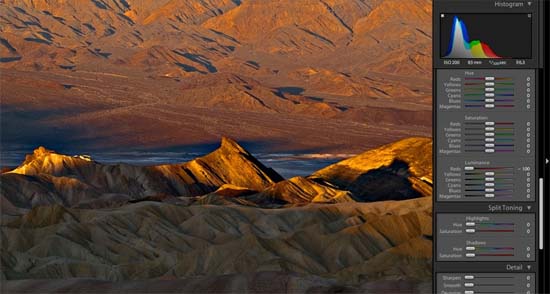|
Adobe Photoshop Lightroom
Adobe's Photoshop Lightroom has arrived on
both PC and Mac which is a must have application for the amateur and
professional photographer. Photoshop Lightroom was created in
consultation with professional photographers from around the globe in
order to give the user access to over 150 camera raw formats and
employing a variety of effects onto the image without tampering the
original image. The program also supports a variety of different image
formats from popular formats such as JPEG and TIFF.
Features (Import)
-
Robust tools to handle large shoots
Speedily process high-volume shoots by automatically importing
images whenever media cards or cameras are connected to your
computer. Then automatically rename files, organize folders, and
make nondestructive adjustments as images are imported.
-
Import/export presets
Streamline the importing and exporting of your files by saving your
frequently used settings in stored presets, which you can recall and
apply when needed.
-
Automatic conversion to DNG
If desired, automatically convert your images from proprietary file
formats to the publicly available Digital Negative (DNG) format as
they are imported, or easily export photographs from your Library in
DNG format.

In its essence, Adobe Photoshop Lightroom transforms your PC or Mac into
a professional photo lab which gives the user access to a plethora of
photographic utilities that allow you to enhance, create and display
your images. The beauty of Lightroom is that Adobe have made this
software package extremely easy to use and to quote Adobe, it's almost
as simply as 1 (Import), 2 (Manage), 3 (Develop) and 4 (Present).
The installation of the application was a breeze and it simply
auto-installed on our PC machine with minimal prompting. Once the
application was installed, we were greeted to an extremely easy to user
interface that will suit a wide variety of different levels of
experience. The interface itself is divided into four easy to navigate
panes with the central pane used as your workspace. As with most Adobe
products, Lightroom is also quite customisable, ensuring enhanced
productivity.
Features (Manage)
-
Multiple viewing options
Quickly find and select your best shots with flexible display
options like the Grid view for groups of thumbnails, the Loupe view
for zeroing in on fine detail in a single image, or the Compare view
for displaying two or more images side by side.
-
Flexible organization of images
Bring order to voluminous image libraries by grouping your
photographs in stored collections. Create collections for different
tasks or subjects, and group similar images within a collection to
organize them further.
-
Manual thumbnail reordering
Put your images in the order that you need them for any particular
task by selecting any number of photographs in your Library
continuous or not and then simply dragging them to a new location
on the Grid.
Video tutorial
-
Organize and compare your photos (SWF,
8:04 mins)
Keep your photo library organized. Lightroom makes sorting your
photos a snap with preset and custom filters.
-
Easy file renaming
Make your photographs easier to find and keep in sensible order
using the Lightroom renaming feature. Simply set naming rules, and
Lightroom automatically renames your images as they're imported.
-
Single or group metadata stamping
Organize and annotate your images by adding metadata to a single
photo or to groups of selected images. Save metadata sets as
presets, which you can apply with one click.
-
Image versions without duplication
Create as many alternate versions of an image as you desire without
overloading your hard drive. Then, switch between versions with a
single click.
-
IPTC/EXIF/XMP metadata support
Read, add, or edit a comprehensive set of metadata entries,
including IPTC, EXIF, and XMP data.
-
Metadata stamping on output
Stamp crucial metadata such as copyright notification, captions,
and keywords on print jobs or exported images so you can search on
it later.
-
Keyword synchronization
Make keywords consistent even if you're using Lightroom on two
different computers by importing and exporting keyword sets to
external, transferable files.
-
Offline image management
Work with your image library in Lightroom even when some or all of
the actual photo files are stored on offline media.
-
Easy Library backup to CD/DVD
Help ensure the safety and preservation of your photographs by
backing them up to CD or DVD using simple built-in tools.
-
Simple keywording
Easily organize your photographs and make them searchable with
keywords that make sense to you. Assign keywords to a single image
or groups of selected images just type and apply.
I must admit that I was pleasantly surprised that Lightroom
automatically detected all our media devices on our PC which included our
Nikon DSLR. The program also handles a large myriad of files without any
issues whatsoever. The program itself contains a very in-depth
catalog system which easily allows you to view all your images and with
a simply click of the mouse, you can bring the image up instantly and
start performing your modifications.

The real selling feature behind Adobe Photoshop Lightroom is that the
software is non-destructive to your original images. Adobe have cleverly
designed this program to alter instruction sets, rather than pixels
which also gives the user access to real-time changes which also
supports batch-editing. The virtual copy aspect of Lightroom uses very
little hard drive space as many professional photographers know how big
some RAW images can be which is all controlled with Lightroom.
Features (Develop)
-
Easy-to-use white balance, exposure,
and contrast controls
Quickly perfect white balance, exposure, and tone curves in your
images, including camera raw files, with familiar slider controls,
or enter numeric values for the most precise adjustments.
-
Simple yet powerful tone curve editor
Precisely control the tonality and contrast of your images by
individually targeting highlights, midtones, and shadows using
sliders and visual controls.
-
Integration with Adobe Photoshop
Instantly send any number of images to Adobe Photoshop (sold
separately) for advanced editing, and see the changes you've made
reflected in the Lightroom Library when you're done.
-
Advanced hue, saturation, and luminance
editing
Enhance color saturation and remove color casts in your images with
individual control over six color ranges each for hue, saturation,
and luminance.
-
Nondestructive editing
Enjoy robust support for more than 140 camera raw formats, and
experiment with confidence. Adjustments you make to images in
Lightroom won't alter the original data, whether you're working on a
JPEG, TIFF, DNG, or camera raw file.
-
Fast zooming
Check sharpness, noise, or small details with nearly instant zooming
a simple keyboard command or mouse click toggles between 100%
magnification and a full-image view. Smoothly navigate highly
magnified areas using the Hand tool in the photo preview pane.
-
Convenient before/after comparison mode
View a side-by-side display of your original picture and a duplicate
that shows the effects of your edits as you make them, or display
the before and after states in a split view of the image. Toggle
either view between portrait and landscape modes, and even see
images in "lights out" view.
-
Finely tuned black-and-white
conversions
Convert color images to black-and-white with precision. Familiar
sliders allow you to control the contrast and detail based on the
colors in the original photograph.
-
Synchronized adjustments across
multiple images
-
Edit large numbers of images faster by
creating presets that you can apply to 4many photographs at once, or
edit one image and then synchronize your adjustments to other photos
you select.
-
Explicit history tracking
Retrace your adjustments to any image the History panel tracks
them automatically as you edit and instantly return to any state
of the photo that you choose.
-
Dust buster
Erase dust spots from an image with a single click.
-
Easy-to-use crop and straighten tools
Crop and straighten your photographs in a snap.
-
Red-eye removal
Quickly eliminate red eye when it occurs in your flash photos.
If you are pleased with the end result or results, the software can then
save the image into a variety of image file formats and quality levels.
History never repeats but Lightroom will allow the user to literally
view almost all the changes made to their photos. The history file of
Lightroom is also quite detailed, displaying clearly the changes the
user has made to the image.

The library aspect of Lightroom is definitely a great catalog program
and with the inclusion of metadata tags, it is extremely easy to
organise and view your images without getting lost in a myriad of
folders. Other tags you can attach to your photos include flags, ratings
and even colour codes.
This powerful photo software package also
comes with a targeted adjustment tool that allows the user to adjust
certain areas of the images such as as contrast and saturation levels
which is extremely easy to use.
Features (Present)
-
Fast, high-quality printing
Quickly and visually format high-quality prints, whether working
with one photo or 100, on one page or many. Recall your favorite
layouts with saved presets and enjoy speedy output, even of large
files.
-
Live preview of HTML or Flash based web
galleries
Create HTML or Adobe Flash® based web galleries for online
presentation with little effort and no programming, and preview the
results in Lightroom before you publish them to your site.
-
Single-click web publishing
Save your web server information in Lightroom as an FTP preset, and
then publish your Flash or HTML galleries with a single click.
There's no more need for a separate FTP client application in your
imaging workflow.
Video tutorial
-
Sophisticated slide shows
Use the simple controls in Lightroom to create and play elegant
slide shows, and include background music from your digital music
library, including iTunes.
-
Signature stamps
Stamp your slide shows, web galleries, and printed output with your
studio or business logo for an added professional touch.
Another impressive feature of Adobe
Photoshop Lightroom is that any changes you make to a particular image,
these can then be applied to other images which is quite a handy tool
for photographers.
As mentioned, Photoshop can support a
variety of photographic file types such as JPEG, TIFF, Photoshop,
Digital Negative and of course RAW which the most powerful file type for
photographers and even of some of the larger RAW files we had, Lightroom
was quite fast at opening and editing the image.
In conclusion, Adobe Photoshop Lightroom is
an extremely powerful photographic software package that is recommended
to all professional and amateur photographers who do not wish to get too
heavily involved in programs such as Adobe Photoshop. Adobe Photoshop
Lightroom is definitely a powerful program that comes at an extremely
affordable cost.
|